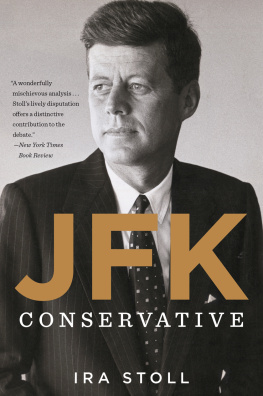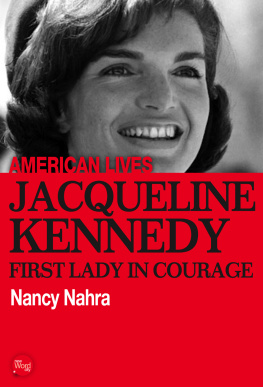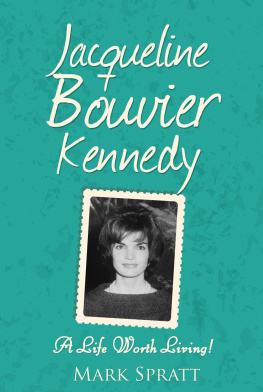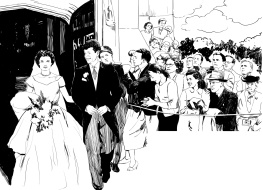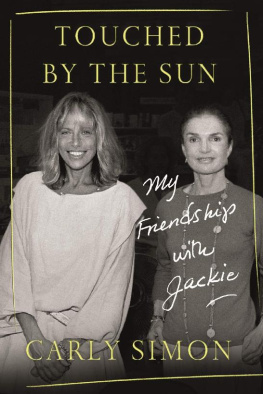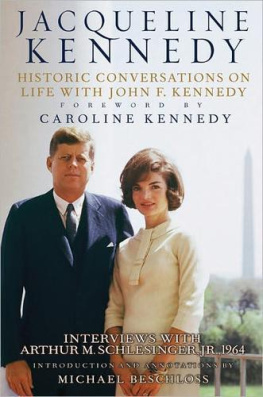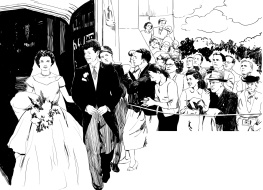Contents
Guide

The author and publisher have provided this e-book to you for your personal use only. You may not make this e-book publicly available in any way. Copyright infringement is against the law. If you believe the copy of this e-book you are reading infringes on the authors copyright, please notify the publisher at: us.macmillanusa.com/piracy.
CONTENTS
One
At a cocktail party in Newport, Rhode Island, in the waning summer of 1945, a loquacious college boy was delivering a chest-thumping monologue to a frizzy-haired, snub-nosed sixteen-year-old named Jacqueline Bouvier. As the young man talked on, her wide-set hazel eyes settled on his face. Jackie, as she was known, allowed him to speak without interruption, but at intervals she nodded to signal that she understood him and the many important things he had to tell her. An observer of the scene would have had no reason to surmise that the quiet, worshipful beneficiary of the collegians wisdom had information and strong opinions of her own about his theme. Jackie was only just discovering boys that year, but she already understood that it was her duty to ensure that he enjoyed himself immensely and had no inkling of what she actually knew or thought.
The boys subject was Marshal Philippe Ptain, the former head of the collaborationist Vichy government. When, in the last days of World War II, a French court sentenced Ptain to face a firing squad, the provisional governments president, General Charles de Gaulle, had moved swiftly and controversially to commute the sentence to life imprisonment, in the interest of relegating the war to the past as soon and as much as possible.
A similar determination to get on with life animated the reopening of Newport societys marriage market eleven days after Japan surrendered unconditionally following the destruction of Hiroshima and Nagasaki. At the time, young men in military uniform were everywhere to be seen throughout the moneyed American resort, presaging a whole series of Newport debutantes marriages to returning soldiers. Immediately, the expansive spirit of the first grand-scale debut party since before Pearl Harbor carried over to other gatherings of the Newport tribe in the final days of August and early September, before the rich summer residentsalong with those less fortunate souls who, having no money of their own, lived and maneuvered among themdispersed for the winter.
It was at one such gathering that Jackie Bouvier was treated to the lecture on the Ptain affair. As it happened, the college boy had had the misfortune to speak of matters she probably knew a good deal more about than he. When Jackie was eleven, her paternal grandfather had dedicated to his ten grandchildren a privately printed family history asserting that the American Bouviers were descended from French nobility. The claim would later prove to have been fraudulent, but it had a tremendous impact on her nonetheless. She was a child who loved to escape into her books, and now French history had become not just reading to her, but a source of personal identity, a guarantee of her own specialness and superiority, consolation for the indignities of a daily life where money was not always as plentiful and ones parents behavior not always as spotless as one might wish. When the Vichy regime signed an armistice with Hitler in 1940, de Gaulle, speaking on BBC Radio from the sanctuary of London, had urged his countrymen to resist. The broadcast provoked Ptain, the idol of de Gaulles youth, to charge de Gaulle with treason and threaten him with death. Impressed by de Gaulles staunch refusal to accept defeat, little Jackie Bouvier seized on him as her hero. For five years, she avidly followed him in newspaper accounts. She named her poodle Gaullie in his honor.
Yet when the young man at the cocktail party held forth, she did what most sensible, well-brought-up girls who hoped to win the Newport matrimonial sweepstakes circa 1945 would have done. The point was to seem bright enough to interest a man but not so bright as to imperil his ego. So Jackie played her part and said nothing. Afterward, her only outlet was to vent her frustration in the form of mockery when she recounted the episode to a female friend: He sounded like a little boy whos just read a big book and is having a lovely time expounding it all to a little country urchin without really knowing what it was all about. I wanted to give him a big maternal kiss on the cheek and tell him he was really a big boy now!
The author of those spiky sentences delighted in being very different from the shy, timid girl, in her own phrase petrified of everything, who had first appeared in Newport two years before, after her mother, Janet Lee Bouvier, married investment banker and Standard Oil heir Hugh D. Auchincloss Jr. Previously, the dissolution of Janets marriage to Jackies father, John Black Jack Bouvier, a stockbroker with a Social Register background, had been prominently chronicled in the tabloid press under the headline Society Broker Sued for Divorce. Accompanying the article, which documented a pattern of infidelity on Mr. Bouviers part, had been a photograph of small-boned Janet and her daughters, Jackie and little Lee. It was not the first time Jackie and her mother had made news. Both were ribbon-winning equestriennes, and prior accounts had spotlighted their accomplishments in the riding ring. Now this new coverage seemed to chip away at the idealized public image to expose the ugly family reality beneath. Taunted by classmates at the private day school she attended in New York at the time and teased by certain of her Bouvier cousins, Jackie reacted to the publicity as if she had been flayed alive. In the aftermath of the ordeal, she became secretive, withdrawn, willfully impossible to read or know. The summer of 1945 was important to her for a number of reasons, not least her newfound popularity among the boys of Newport. It was certainly not that Jackie, who had oddly broad features, a splash of freckles across her nose and under both eyes, and disproportionately large hands and feet, was prettier than her female contemporaries, only that in a world where most of the young people had known one another all their lives, she suggested a flavor the boys had not tasted before.
On her return to boarding school, Miss Porters in Farmington, Connecticut, two of those boys wrote repeatedly to her from Harvard. Jackie judged that her replies had better be devastatingly witty. She also calculated that since her correspondents knew each other well and belonged to the same college social club, the Owl, it was necessary to compose entirely different letters to each. This required a good deal of labor on her part. Half in earnest and half in jest, she was soon bemoaning the agony she had to endure drafting separate missives to nineteen-year-old John Sterling and twenty-year-old R. Beverley Corbin Jr. Despite her laments, both boys struck her as tremendously appealing. John Sterling was the son of a distinguished career diplomat and former U.S. ambassador to Sweden, Bev Corbin of an attorney who was also the president of Baileys Beach in Newport. When she was with him, she loved talking to John, who was smart and interesting and had actually seen a bit of the world. The problem, by her own account, was that she was not physically attracted to him. With Bev, by contrast, it was all physical.
Jackie found Bev shallow and was ashamed of liking him as much as she did, but there it was. She acknowledged that some of her friends, mystified by what she saw in Bev, had begun to look at her as though she were insane or had queer glands. Im beginning to think so myself! she declared. Neither fellow had kissed her yet. Jackie said she would love it if Bev tried, but would upchuck if it were John. Still, on paper John enjoyed a distinct advantage. While Bevs letters tended to be ordinary, Johns were clever and funny. In Jackies own letters, instead of the backbiting about mutual friends and acquaintances she might have indulged in had her correspondent been a girl, it seemed wiser to reserve her venom for prison, as she referred to her boarding school and the quiet, conservative New England town where its porticoed white-clapboard dormitories were set. If schooldays are the happiest days of your life, she deadpanned to Bev, Im hanging myself with my skip-rope tonight.


